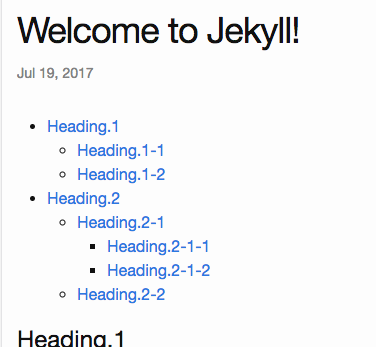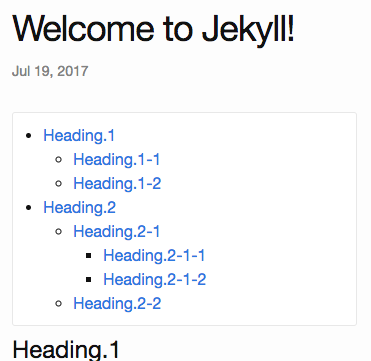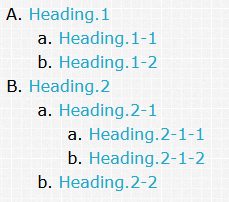README.md
# jekyll-toc

[](https://badge.fury.io/rb/jekyll-toc)
[](https://codeclimate.com/github/toshimaru/jekyll-toc)
[](https://codeclimate.com/github/toshimaru/jekyll-toc/test_coverage)
## Table of Contents
- [Installation](#installation)
- [Usage](#usage)
- [Basic Usage](#basic-usage)
- [Advanced Usage](#advanced-usage)
- [Generated HTML](#generated-html)
- [Customization](#customization)
- [Default Configuration](#default-configuration)
- [TOC levels](#toc-levels)
- [Enable TOC by default](#enable-toc-by-default)
- [Skip TOC](#skip-toc)
- [Skip TOC Sectionally](#skip-toc-sectionally)
- [CSS Styling](#css-styling)
- [Custom CSS Class and ID](#custom-css-class-and-id)
- [Using Unordered/Ordered lists](#using-unorderedordered-lists)
- [Alternative Tools](#alternative-tools)
## Installation
Add jekyll-toc plugin in your site's `Gemfile`, and run `bundle install`.
```ruby
gem 'jekyll-toc'
```
Add jekyll-toc to the `gems:` section in your site's `_config.yml`.
```yml
plugins:
- jekyll-toc
```
Set `toc: true` in posts for which you want the TOC to appear.
```yml
---
layout: post
title: "Welcome to Jekyll!"
toc: true
---
```
## Usage
There are three Liquid filters, which can be applied to HTML content,
e.g. the Liquid variable `content` available in Jekyll's templates.
### Basic Usage
#### `toc` filter
Add the `toc` filter to your site's `{{ content }}` (e.g. `_layouts/post.html`).
```liquid
{{ content | toc }}
```
This filter places the TOC directly above the content.
### Advanced Usage
If you'd like separated TOC and content, you can use `{% toc %}` tag (or `toc_only` filter) and `inject_anchors` filter.
#### `{% toc %}` tag / `toc_only` filter
Generates the TOC itself as described [below](#generated-html).
Mostly useful in cases where the TOC should _not_ be placed immediately
above the content but at some other place of the page, i.e. an aside.
```html
<div>
<div id="table-of-contents">
{% toc %}
</div>
<div id="markdown-content">
{{ content }}
</div>
</div>
```
:warning: **`{% toc %}` Tag Limitation**
`{% toc %}` works only for [Jekyll Posts](https://jekyllrb.com/docs/step-by-step/08-blogging/) and [Jekyll Collections](https://jekyllrb.com/docs/collections/).
If you'd like to use `{% toc %}` except posts or collections, please use `toc_only` filter as described below.
```html
<div>
<div id="table-of-contents">
{{ content | toc_only }}
</div>
<div id="markdown-content">
{{ content | inject_anchors }}
</div>
</div>
```
#### `inject_anchors` filter
Injects HTML anchors into the content without actually outputting the TOC itself.
They are of the form:
```html
<a class="anchor" href="#heading1-1" aria-hidden="true">
<span class="octicon octicon-link"></span>
</a>
```
This is only useful when the TOC itself should be placed at some other
location with the `toc_only` filter.
## Generated HTML
jekyll-toc generates an unordered list by default. The HTML output is as follows.
```html
<ul id="toc" class="section-nav">
<li class="toc-entry toc-h1"><a href="#heading1">Heading.1</a>
<ul>
<li class="toc-entry toc-h2"><a href="#heading1-1">Heading.1-1</a></li>
<li class="toc-entry toc-h2"><a href="#heading1-2">Heading.1-2</a></li>
</ul>
</li>
<li class="toc-entry toc-h1"><a href="#heading2">Heading.2</a>
<ul>
<li class="toc-entry toc-h2"><a href="#heading2-1">Heading.2-1</a>
<ul>
<li class="toc-entry toc-h3"><a href="#heading2-1-1">Heading.2-1-1</a></li>
<li class="toc-entry toc-h3"><a href="#heading2-1-2">Heading.2-1-2</a></li>
</ul>
</li>
<li class="toc-entry toc-h2"><a href="#heading2-2">Heading.2-2</a></li>
</ul>
</li>
</ul>
```

## Customization
jekyll-toc is customizable on `_config.yml`.
### Default Configuration
```yml
# _config.yml
toc:
min_level: 1
max_level: 6
ordered_list: false
no_toc_section_class: no_toc_section
list_id: toc
list_class: section-nav
sublist_class: ''
item_class: toc-entry
item_prefix: toc-
```
### TOC levels
```yml
# _config.yml
toc:
min_level: 2 # default: 1
max_level: 5 # default: 6
```
The default heading range is from `<h1>` to `<h6>`.
### Enable TOC by default
You can enable TOC by default with [Front Matter Defaults](https://jekyllrb.com/docs/configuration/front-matter-defaults/):
```yml
# _config.yml
defaults:
- scope:
path: ""
values:
toc: true
```
### Skip TOC
The heading is ignored in the toc by adding `no_toc` class.
```html
<h1>h1</h1>
<h1 class="no_toc">This heading is ignored in the TOC</h1>
<h2>h2</h2>
```
### Skip TOC Sectionally
The headings are ignored inside the element which has `no_toc_section` class.
```html
<h1>h1</h1>
<div class="no_toc_section">
<h2>This heading is ignored in the TOC</h2>
<h3>This heading is ignored in the TOC</h3>
</div>
<h4>h4</h4>
```
Which would result in only the `<h1>` & `<h4>` within the example being included in the TOC.
The class can be configured on `_config.yml`:
```yml
# _config.yml
toc:
no_toc_section_class: exclude # default: no_toc_section
```
Configuring multiple classes are allowed:
```yml
# _config.yml
toc:
no_toc_section_class:
- no_toc_section
- exclude
- your_custom_skip_class_name
```
### CSS Styling
The toc can be modified with CSS. The sample CSS is the following.
```css
.section-nav {
background-color: #fff;
margin: 5px 0;
padding: 10px 30px;
border: 1px solid #e8e8e8;
border-radius: 3px;
}
```

Each TOC `li` entry has two CSS classes for further styling. The general `toc-entry` is applied to all `li` elements in the `ul.section-nav`.
Depending on the heading level each specific entry refers to, it has a second CSS class `toc-XX`, where `XX` is the HTML heading tag name.
For example, the TOC entry linking to a heading `<h1>...</h1>` (a single `#` in Markdown) will get the CSS class `toc-h1`.
### Custom CSS Class and ID
You can apply custom CSS classes to the generated `<ul>` and `<li>` tags.
```yml
# _config.yml
toc:
list_id: my-toc-id # Default: "toc"
list_class: my-list-class # Default: "section-nav"
sublist_class: my-sublist-class # Default: no class for sublists
item_class: my-item-class # Default: "toc-entry"
item_prefix: item- # Default: "toc-":
```
### Using Unordered/Ordered lists
By default the table of contents will be generated as an unordered list via `<ul></ul>` tags. This can be configured to use ordered lists instead `<ol></ol>`.
This can be configured in `_config.yml`:
```yml
# _config.yml
toc:
ordered_list: true # default is false
```
In order to change the list type, use the [list-style-type](https://developer.mozilla.org/en-US/docs/Web/CSS/list-style-type) css property.
Add a class to the `sublist_class` configuration to append it to the `ol` tags so that you can add the `list-style-type` property.
Example
```yml
# _config.yml
toc:
ordered_list: true
list_class: my-list-class
sublist_class: my-sublist-class
```
```css
.my-list-class {
list-style-type: upper-alpha;
}
.my-sublist-class: {
list-style-type: lower-alpha;
}
```
This will produce:

## Alternative Tools
- Adding anchor to headings
- [AnchorJS](https://www.bryanbraun.com/anchorjs/)
- Generating TOC for kramdown content
- [Automatic “Table of Contents” Generation](https://kramdown.gettalong.org/converter/html.html#toc) (See also. [Create Table of Contents in kramdown](https://blog.toshima.ru/2020/05/22/kramdown-toc))